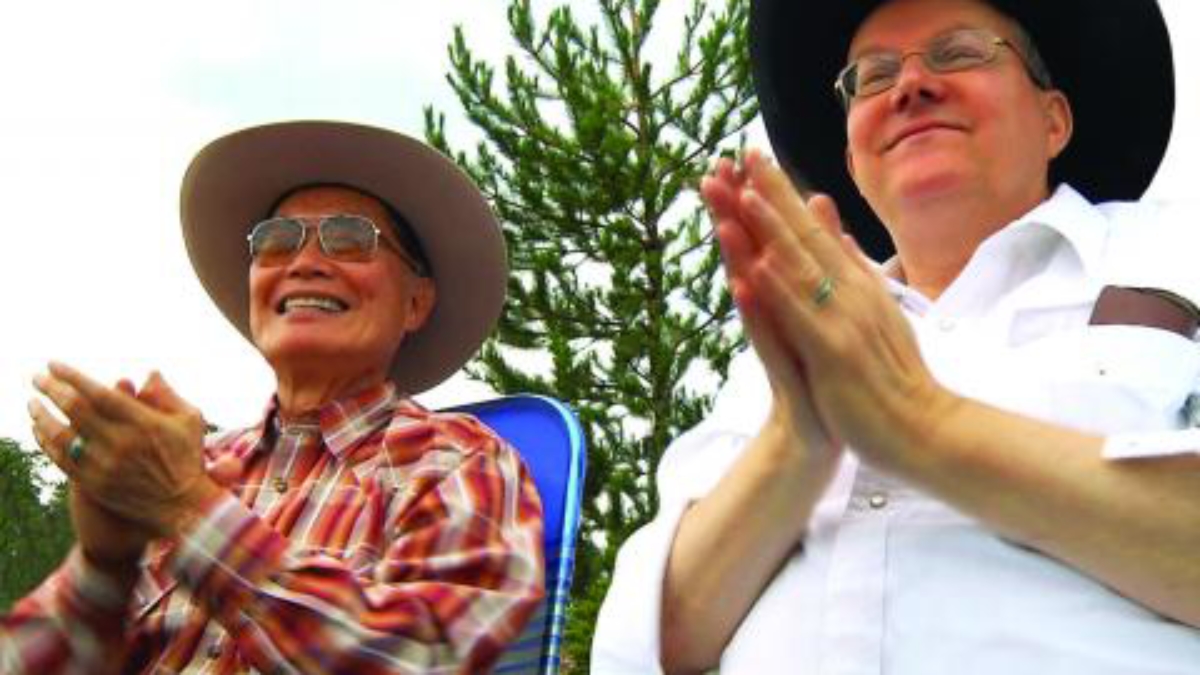Take It Easy, “Takei” It Seriously
Review of To Be Takei by Bing Wang
George Takei is a prominent Asian American actor whose name gets habitually mispronounced, a gay rights crusader who fights with warm wit rather than belligerent fangs, and “the best helmsman in the galaxy.” Refreshing all these renowned images, Jennifer Kroot’s entertaining biographical documentary To Be Takei separates itself as it reveals a troubled soul struggling through profound historical trauma and mundane miscellanies. However, the exploration of each of these identities is done in such an isolated and sometimes superficial manner that she might have missed out on certain complexities of the character.
Beginning his career in Hollywood in the late 1950s, George Takei faced enormous homophobia and industrial ignorance of Asian cast. He embraced the art of “gaman” and applied his acting skills to performing ethnic stereotypes on screen and a heterosexual man in real life. While a career breakthrough came with his acclaimed portrait of Lieutenant Hikaru Sulu who steered the Starship Enterprise through three television seasons and six movies, his sexual pretense continued until 2005 when he came out publicly and became an outspoken activist for marriage equality and LGBT rights. He has also been the frequent recipient of awards from various dignitaries and governments for raising awareness of the Japanese-American internment and repairing relations between the U.S. and Japan.
To Be Takei revisits these memories back and forth fairly freely and pieces together the fragments of a colorful, endearing human being, a man always surrounded by an aura of self-protective quietude. To find out who George Takei really is, what the film lacks is a more in-depth examination of how his multiple identities merge and even occasionally conflict with each other. Both queer subtexts and racial sensibilities in the sci-fi genre are touched upon through Bill Weber’s deft editing of show footage and interviews; Takei’s husband Brad Takei recalls how he was excluded from a Tokyo ceremony honoring George because male partners are not allowed to enter the Imperial Palace. But still, how gayness and Asianess coincide, both embodied by an actor individually and united for a larger social justice movement, requires deeper pondering than simple repetitive use of the humanitarian’s various public appearances.
One of my regrets is that even the most featured “being-a-gay-man” storyline in the film doesn’t develop to full satisfaction. The quick reenactment of the couple’s encounter and falling in love ends with Brad’s typical efficient conclusion “It’s not a good story. Did I answer your question?”—George’s first sexual experience with a summer camp counselor is more vividly recollected. Even one of the film’s most poignant moments when the couple journey a trek to scatter the ashes of Brad’s mother pales in comparison with the extraordinary storytelling in last year’s tear-jerking queer documentary Bridegroom (2013). It is a pity that the film refuses to probe into more serious arguments. In small talk about gay couples’ notorious devotion to spoiling their pets, Takei surprisingly comments they never had children because same-sex parenting was not fair for the children, which Brad clearly disagrees with and showcases his unapologetic careerism from his younger years. Another example is George’s constant statement that “being gay is not a lifestyle but an orientation” (he even corrects Brad’s expression once in front of the camera), which, again, receives no further elaboration.
There are invisible yet tangible walls surrounding Takei that frustrates a visceral outreach. It’s interesting to think about the power dynamics between the filmmaker and her famous subject in To Be Takei, with Takei’s loving and detail-oriented manager/husband intervening the process. Brad gives filming suggestions to the camera and calculates the potential reception of Takei’s representations. Considering the actor’s continually expanding career and the fact that his signature is sold for $35 on the science fiction convention circuit throughout the world, his vigilance is understandable. Thus Ms. Kroot resorts to an alternative technique—to pepper her film with more celebrities’ insignificant presences. While John Chou and B. D. Wong share bullet points of being Asian American actors, and Dan Savage contributes LGBT community perspectives, Star Trek crewmates William Shatner, Leonard Nimoy, Nichelle Nichols and Walter Koenig lend the film rather lukewarm support. The fact that remarks such as “he’s done things” are included exemplifies this pushy celebrity-driven strategy.
The film gains substantial narrative momentum and emotional heaviness through its historical exploration of the Japanese-American internment and the postwar anti-Japanese sentiment. After Pearl Harbor, Japanese-Americans were targeted as possible threats. The four-year-old Takei was transported with his family and tens of thousands of Japanese American citizens to a swamp in Arkansas. This dark, dehumanizing experience deprived innocent people of their properties and liberties but not dignity: Takei’s father refused to “foreswear alliance with Japan,” which caused the family’s further victimization. “No one can take your dignity,” the father taught his son; it enlightened both Takei and the entire ethnic group. The film’s archival display of that era of hostility and humiliation helps the viewer understand what Takei really means when he corrects Howard Stern—“not Japanese, but Japanese American,” and appreciate the resilience of humanity.
To Be Takei, like Takei himself, is generously exuberant half the time and idiosyncratically controlled the other half, with occasional bouts of graceful pensiveness between. Ms. Kroot captures some of the vitality and peculiarity of an incredibly charming subject. It serves as a mediocre soft promo for Takei’s musical awaiting a Broadway opening this year, mellow love notes of his long-time relationship with his husband, and a lighthearted collage (if not a bit overwhelming) of stardom.
Bing Wang 王冰 is a filmmaker and producer. He was associate producer of 9-MAN.
“To Be Takei” is set to screen at the Film Society at Lincoln Center as part of the Human Rights Watch Film Festival on June 15. For more information and tickets, click HERE.

